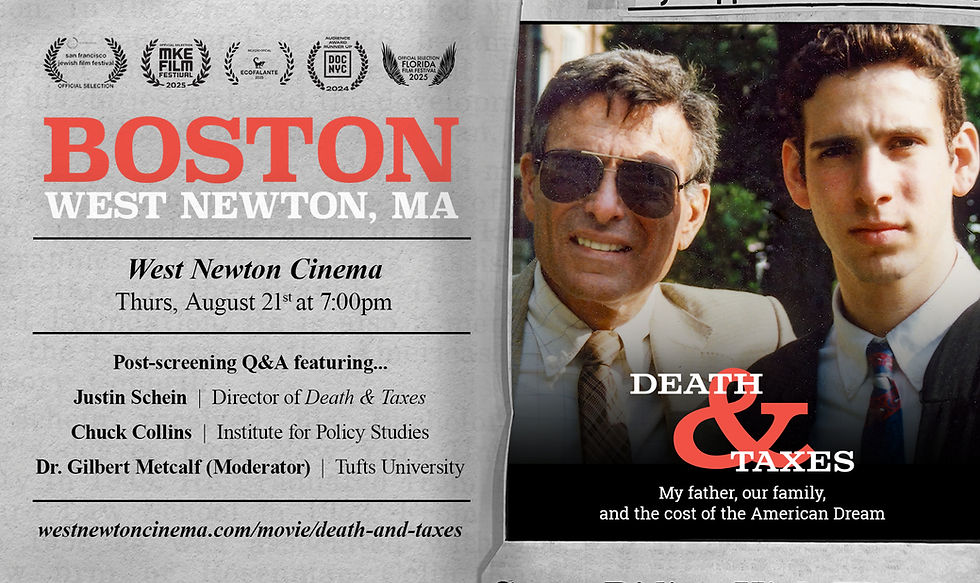Meet the Tax That Oligarchs Love to Hate
- Jul 16, 2025
- 3 min read
Blog Post in the "Indypendent" July 16
Eleanor J. Bader

A new film about the inheritance tax deftly uses the arguments between a “self-made” conservative multi-millionaire and his progressive son.
Eleanor J. Bader Jul 16
As a child, Justin Schein lived on Manhattan’s Upper East Side and attended private schools. But the city bus he took to attend classes — his dad’s frugality kept him from taking taxis or using a private transportation service — traveled through the South Bronx, then the poorest congressional district in the United States.
It was the 1980s, and the contrast between tony Park Avenue and the vacant lots and burned-out buildings of Melrose, Morrisania, and Mott Haven unsettled him. Over time, Justin and his dad, Harvey Schein, began to argue, first about music, clothing, and personal style, and then about ethics and politics, including the blatant disparities between rich and poor.
For his part, Harvey — head of the international division of Columbia Records, and later director of the U.S. division of SONY — had grown up in working-class Brooklyn, the fourth child of Eastern European Jewish immigrants. He considered himself self-made despite the hand up he’d received from the GI Bill, a post-World War II benefit that allowed him to attend both college and law school on the government’s dime.
As he aged, Justin reports that his dad became increasingly conservative — and ultimately became obsessed with stopping the inheritance tax, a federal measure that currently requires people who inherit more than $13.61 million (the cap will be raised to $15 million in 2026) to pay 40% to the government.
Death and Taxes, Justin’s poignant documentary about his relationship with his father, is a compelling look at their political disagreements — including arguments over the efficacy of the inheritance tax — and is a deeply felt ode to their loving, if troubled, bond.
Harvey, like many conservatives, saw (and most on the right continue to see) the inheritance tax as “double taxation,” arguing that because he had already paid taxes on his earnings and assets, this amounted to an unwarranted and burdensome second charge. Justin disagreed, and Death and Taxes takes a deep dive into the machinations that have governed the fee since it was first imposed in 1916. Moreover, numerous talking heads on the right (including GOP strategist Frank Luntz, the man credited with coining the term ‘death tax’; Grover Norquist of Americans for Tax Reform; and Stephen Moore of the Heritage Foundation) and left (among them, former Secretary of Labor Robert Reich, who notes that Baby Boomers are expected to gift $30 trillion to the next generation) offer insights into the history of the charge.
All told, the film is an eye-opening exploration of a tax that fewer than 1% of U.S. residents will ever pay. The film further elucidates the ways that legal systems protect wealth to preserve a rigid class and race hierarchy. They’re maddening revelations.
To its credit, Death and Taxes does not shy away from condemning financial transfers between generations; nonetheless, it is the personal story of the relationship between Justin, his brother Mark, and their parents that gives the film its power.
The multiple ways that Harvey’s focus on the inheritance tax distorted his worldview and kept him from enjoying his money is tragic. Likewise, his failure to appreciate his wife’s innumerable sacrifices and unmet needs is enraging, and the pair’s temporary split revealed the full extent of the fixation. “My dad chose lower taxes over his wife of 40 years,” Justin says in the film.
It’s horrifying.
And then it was over. Harvey’s death from cancer left each member of his immediate family exceedingly well-off. But Justin continues to be deeply critical of the advantages he has received.
“In the years since Harvey died,” Justin says, “inequality has continued to skyrocket.” Furthermore, while he says that he wants to take good care of his two sons and ensure that they’re generously provided for, he also wants them to inherit a better, fairer, and more equitable world. “Dad left me many things — material, gestures, and the financial freedom to do work that I think is important,” he says. “But he also left me with many questions. I want my kids to live in a society that is not broken. This is the legacy I want to leave behind.”
Salty Features and Shadowbox Films
Directed by Justin Schein
85 minutes
Death and Taxes will be shown in New York City on July 17, 18, 19, and 20. For information on the time and place of screenings, go to deathandtaxesfilm.com. Contact cindy.bonach@gmail.com for information about purchasing or renting the film.















Comments